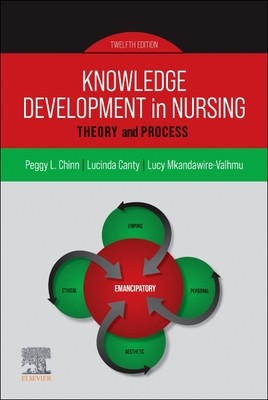
- We will send in 10–14 business days.
- Author: Peggy L Chinn
- Publisher: Elsevier
- ISBN-10: 0443127115
- ISBN-13: 9780443127113
- Format: 15.5 x 22.9 x 1.1 cm, mīksti vāki
- Language: English
- SAVE -10% with code: EXTRA
Reviews
Description
Knowledge Development in Nursing focuses on the evolution of Barbara Carper's five patterns of knowing to help students apply theory to practice and develop sound clinical judgment. Unlike most of the other nursing theory titles on the market, it only covers one main theory/theorist, and each new edition discusses the continual evolution of this theory. The key features of this title are: Learning and Study Questions features - emphasizing the application of each chapter's content to nursing practice - are included at the end of each chapter. 2021 AACN Essentials for Nursing Education domains relevant to this text are addressed throughout this new edition. QR codes throughout the text direct students to an animation that explains the five Patterns of Knowing and to resources on Nursology.net (Peggy Chinn's website) that further illustrate and explain the nursing theories in each chapter. A discussion of the five Patterns of Knowing includes empiric, personal, aesthetic, ethical, and emancipatory knowledge, defining the different types of knowledge and how they relate to each other. A discussion of evidence-based practice provides examples of how the five patterns of knowing may be applied to nursing practice.Coverage of theory, theory development, and the relationship of theory to nursing research and practice helps students learn to apply theory to practice.
Interpretive summaries highlight the interrelatedness of all patterns of knowing, making it easier for students to apply all dimensions of knowing to specific chapter content. A full-color diagram in the front of the book depicts how the patterns of knowing are related. An appendix at the end of the text includes additional learning activities. A glossary defines the key terms and concepts of nursing theory. *NEW! This edition will address recent trends related to decolonization, post-structuralism, postmodernism, and post-humanism. *Emphasize issues of equity and social justice throughout.
*Include content that explicitly names and discusses knowing that originates from cultures and traditions outside of a Euro-centric point of view.
*Include a deeper discussion of ways to embrace knowing patterns other than empirics (which is already addressed), without compromising empirics or any of the patterns of knowing.
*Address recent trends related to post-structuralism, postmodernism, and post-humanism.
*Updated throughout to reflect the latest research and best practices.
EXTRA 10 % discount with code: EXTRA
The promotion ends in 22d.02:31:39
The discount code is valid when purchasing from 10 €. Discounts do not stack.
- Author: Peggy L Chinn
- Publisher: Elsevier
- ISBN-10: 0443127115
- ISBN-13: 9780443127113
- Format: 15.5 x 22.9 x 1.1 cm, mīksti vāki
- Language: English English
Coverage of theory, theory development, and the relationship of theory to nursing research and practice helps students learn to apply theory to practice.
Interpretive summaries highlight the interrelatedness of all patterns of knowing, making it easier for students to apply all dimensions of knowing to specific chapter content. A full-color diagram in the front of the book depicts how the patterns of knowing are related. An appendix at the end of the text includes additional learning activities. A glossary defines the key terms and concepts of nursing theory. *NEW! This edition will address recent trends related to decolonization, post-structuralism, postmodernism, and post-humanism. *Emphasize issues of equity and social justice throughout.
*Include content that explicitly names and discusses knowing that originates from cultures and traditions outside of a Euro-centric point of view.
*Include a deeper discussion of ways to embrace knowing patterns other than empirics (which is already addressed), without compromising empirics or any of the patterns of knowing.
*Address recent trends related to post-structuralism, postmodernism, and post-humanism.
*Updated throughout to reflect the latest research and best practices.


Reviews